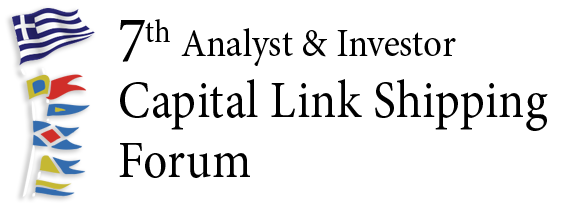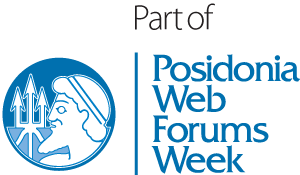In Cooperation With


Global Lead Sponsor

Lead Sponsor

Global Gold Sponsors
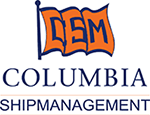

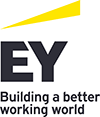
Global Sponsors





Event Sponsors


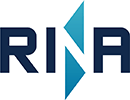
Supporting Sponsors










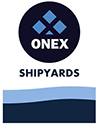
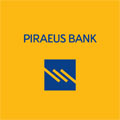

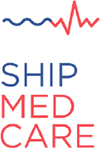
Greek Shipping Thought Leadership
The Greek Shipping Miracle – A Journey in Time |
|||
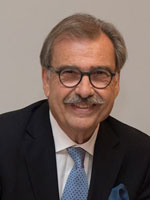 |
George M. Foustanos
“It is amazing, that despite the heavy financial loss suffered during various crises, Greek-owned shipping always emerged at the end with a fleet improved, both in terms of size and quality. This can be only explained by the fact that Greeks never lose faith into the Sea and are traditionally reinvesting most of their earnings in ship acquisitions. They believe in the wealth it can offer generously, to all mankind. “The Sea gets sick, but never dies”, was a motto by our forefathers. We do accept this as a fact. Whenever facing a recession, we know very well, that sooner or later, it will be followed by better days…." |
||
The Development of the Greek Shipping Cluster |
|||
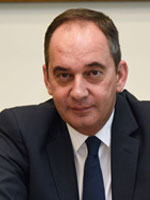 |
Ioannis Plakiotakis
"In his key note speech the Minister of Maritime Affairs and Insular Policy of the Hellenic Republic, Mr. Ioannis Plakiotakis, referred to the new data that emerged in shipping after the impact of the pandemic and stressed the need to maintain the excellent level of cooperation developed by all stakeholders to overcome the problems and return the global economy to the path of growth and prosperity. In relation to the current challenges in the shipping sector, reference was made to the major changes related to the new technologies - such as automation and cyber security - but also to the need to adapt to the new environmental regulations. Finally, he underlined the importance of maritime education and the role it will play in the years to come, highlighting the need for better-trained crews and the need for all maritime parties to turn in the direction of strengthening it." |
||
Shipping in the Post Covid-19 Era
|
|||
 |
Benjamin Wong
"With the dire situation of seafarers stranded at sea because of COVID-19, the global shipping communities have been calling for action and Greece is amongst the 13 countries signing crew change pact. Benjamin Wong raised the question of how are they coping with the situation to five renowned Greek shipowners and ship managers. Measures discussed focus on prioritising seafarers welfare on vessels, including but not limited to the provision of internet to ensure free and easy communications with families on shore, as well as test kits and 24/7 tele-medication. The panel also agreed that seafarers are frontline workers who provide commodities and daily necessities to the world and called for all Governments to show support to the shipping industry." |
||
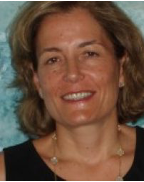 |
Marily Frangistas
"Crew changes, continue facing unprecedented challenges that present serious threats to our Industry and its seafarers. Even though, essential workers’ rights and fundamental human rights, were, and still are at stake, a multitude of efforts starting from Shipowners, their associations, Intercargo, IMO and numerous other institutions, up to the level of his Holiness, the Pope, failed to solve this huge issue, despite the worldwide awareness achieved. We are grateful to our good and loyal Masters, and to all seafarers, for their continuous efforts, who throughout the crisis, continued to work and deliver goods and cargoes to their destinations." |
||
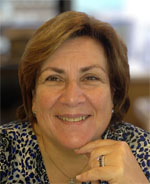 |
Calypso Nomikos
"Τhe shipping industry, by nature a 24/7 business, with ship to shore constant communication and speed and adaptability in its' DNA, adjusted quickly to work from home on the shore side. It was an opportunity to accelerate and implement changes that previously might have met with resistance within organizations. Companies with a good reputation - built over the years on integrity and trust - also fundamental elements within shipping's DNA, capitalized on this and achieved an extraordinary feat in continuing business as usual and even expanding it through the use of technology . Drydocking's, virtual closings and deliveries are just a few examples." |
||
Fleet Renewal – Building the Ships of the Future |
|||
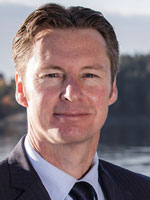 |
Knut Ørbeck-Nilssen
"Shipowners of today are having to make fleet renewal decisions in the face of intense pressures. Uncertainty around which fuels, technologies and vessel designs will be compliant in future add to the weight of decision-making. My message is this: We can't allow perfect to become the enemy of good. We can't afford to wait around for the ideal fuel to come along. Our research shows that installing a dual-fuel LNG engine is a robust choice for today enabling future flexibility for vessels. Our findings also show that over the next decade, the industry needs to start rolling out a new generation of carbon-neutral ships if we are to make enough headway to meet the IMO's 2050 goals. In these extraordinary times, we must make sound decisions today which protect our tomorrow." |
||
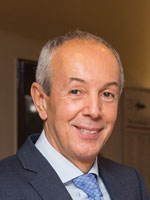 |
John Coustas
"The whole world is working towards decarbonization and of course shipping must do its fair share . However the domain of our expertise is in the efficiency of transportation and the design of vessels and propulsion systems that minimize the energy required for every ton-mile transported by sea. We are not in the business of producing fuel same as for IMO 2020 sulphur cap it is the oil industry that provided compliant fuel . We have come a long way in reducing the carbon intensity by optimizing the vessels and reducing the speed but we need to go along the land based infrastructure of carbon neutral fuels which today does not exist . We can burn biofuel today with our existing engines but there is no such fuel available in quantities and further there is no subsidy for its cost . Charterers who are responsible for the fuel cost have to take the initiative to provide carbon neutral fuel and reduce carbon footprint." |
||
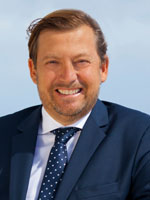 |
Alexandros Panagopoulos
"Underlined that ship emissions data will eventually morph into a new currency by which investment-worthiness will be measured. On choice of fuel for shipping he said that today he does not see any other realistic and practical choice other than LNG and then a mixture of it with biogas as “with unrivalled cost and environmental credentials, with the infrastructure, the availability, the rules, and the competitive cost of LNG, all point to that.” As he said, “we all know that getting to absolute zero is the ultimate target, but the fuel and the technology that will get us there has not been invented yet.” |
||
Geopolitics, World Trade and Shipping |
|||
 |
Nicholas Brown
"Two leading Greek principals, Thanassis Martinos and John Hadjipateras addressed the big questions in this session: China; the energy transition: digitalization; women in shipping; and the future for Greek shipping - as a key supplier of the world’s tonnage and shipping expertise. Both John and Thanassis are optimistic about the future for shipping in general, and for Greek shipping. Free trade is best, but even in a world where there might be more regulation or factors that inhibit trade there would always be opportunity for shipowners and the knowhow and flexibility of Greek shipowners remains a great source of strength." |
||
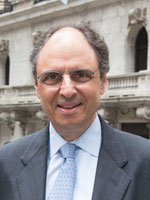 |
John Hadjipateras
"I am grateful for the opportunity and honored to have shared a panel during Capital Link, with my friend and highly respected leader of the shipping community, Thanasis Martinos. The topic, Geopolitics, covered subjects ranging from the trade war, carbon reduction initiatives, the importance of Greek shipping in world trade and its position in the EU, opportunities and benefits of digitization and diversity. I believe we shared an optimistic view for the prospects of world trade and the hope and expectation that the enterprising spirit and professional commitment of the next generation will ensure that Greek Shipping continues “At the forefront of Global Trade." |
||
Shipping – Contribution to Society |
|||
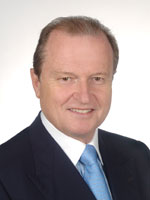 |
George Tsavliris
"I wish to thank my friends Nicolas and Olga Bornozis and their valued team for giving me the unique opportunity to act as moderator on a panel which was comprised of some of the most distinguished names in Greek shipping. Unfortunately, the contribution of Greek shipping to our society frequently goes unnoticed due to the humbleness which defines Greek shipowners. At the same time, the hard work, the constant risks, the personal sacrifices which they have to make/and their families have to tolerate in order to realize such achievements - are often overlooked. Foundations such as the Aikaterini Laskaridi Foundation, the Evgenides Foundation, Capt. Vasilis Constantakopoulos’ Costa Navarino ( and his founding role in the birth of HELMEPA ), the Onassis Foundation , the Tsakos Foundation and Capt Tsakos’ input in the Nautical School in Chios, are all reflective of the core value of Greek shipowners which is to give back to our society. Last and not least, SYN-ENOSIS (the Greek Shipowners’ Social Welfare Company ) is also reflective of the immense effort and valuable contribution made to the homeland. Shipping and society will always go hand in hand; For generations, shipping has played an enormous role in the wealth of our nation, in employment, in generating foreign exchange income, in science, in education, in promoting our culture, in protecting our environment and is a strategic partner in supporting our National Defense ; We hope that in this journey, we managed to inspire the next generation with our romance for the sea and our people. I will leave you with the words of Odysseas Elytis, which I have quoted on many occasions : “If we dissassemble Greece, we will find an olive tree, a grapevine and a ship ; which means that with only these three ingredients, we can rebuild our country." |
||
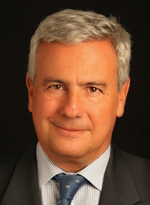 |
Leonidas Dimitriadis-Evgenidis
"Ιllustrated the importance of Shipping for the world economy, as well as to the wellness of the society, where Greek shipping contributes vastly due to its leading position. Whereas there is an increasing awareness of the importance of shipping to the Greek economy, thanks also to numerous studies conducted recently, there is still lack of awareness of the size and the many facets of its contribution to the Greek society. However, the immediate and massive response to the COVID-19 pandemic by shipping, emanating from collective initiatives such as Syn-enosis, from charitable foundations and other forms, is changing the scene; communication of the ensuing most substantial - at a critical time for the country - results must increase, while joining forces of stakeholders related to shipping even more, will see that initiatives combine optimally into long-term sustainable actions and to the benefit of society." |
||
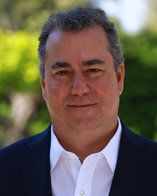 |
Achilleas Constantakopoulos
"Sustainability, social responsibility and respect are core values of our business culture and operations. With a strong commitment to making a positive contribution to society, our investments and efforts focus on three key areas of sustainable growth, namely agricultural development, environmental protection, as well as social and economic impact on our community, both locally in Messinia and throughout Greece." |
||
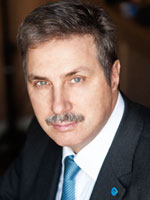 |
Anthony S. Papadimitriou
"Shipowners have been at the forefront of public benefit activities in Greece. They have replaced the generation of public benefactors from Epirus, Egypt and Russia like Syngros, Benakis, Tositsas, Averoff etc. Why do we do these public benefits or charitable activities and how should we go about it? Is it to beg forgiveness for allegedly wrecking the environment, exploiting the workers and not paying taxes? Having taken the decision to do something to give back to society and assist our fellows, we are faced with a dilemma. which summarized as “curing a bad or creating a good”? The field of possible actions is infinite and the funds needed are also infinite! My recommendation is: if you can give a substantial sum, use it wisely in one bigger project rather than cut it in smaller pieces. Always measure the impact of what you do in terms of your own conscience. If it were an investment, would you do it?" |
||
Embracing the Technological Revolution |
|||
 |
Christos Mangos
"We have shown tremendous resilience in this new global challenge. Businesses adapted quickly, and governments responded decisively and with apparent magnitude. Underlying the continued drive in the economy is, to a great extent, our ability to embrace technology. We have seen many doors open this year that will not close: working from home, online retail, lawfulness of virtual transactions. The combined efforts of governments and the private industry give substantiated optimism that we will recover swiftly from this epidemic, and hope that we have the resource and determination required to reverse the effects of climate change. " |
||
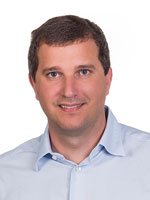 |
Ioannis Martinos
"We started Signal with an overarching question: Can one use technology to trade Aframaxes on the spot market and commercially outperform by at least $1,000 per vessel per day? After five years of extensively using technology to aframax tanker chartering we can confirm that $1,000 overperformance is 100% achievable. Actually this number can be much higher if the team using the technology has both exceptional commercial shipping as well as technology skills; for example last year this outperformance number for our team was $5,000. Based on this performance we launched a pool which is now the biggest Aframax pool in the world. A big part of Signal’s work during the last five years was to create an information processing engine for live market data and movements. Two years ago we made this platform commercially available and we now have about 100 clients representing 50% of the large spot crude tankers and 40% of crude oil cargos using our software platform today. We are now close to having a dry version of the product. Closing, we believe that in the future technology will enable shipping to get to zero emissions. There have already been big developments in propulsion. This will be expensive but we also believe that with the help of technology the market will consolidate at the commercial level, maintaining healthy returns, which will make the transition to decarbonization viable. We already have seen successful alliances in the container market and this makes us optimistic for the Tankers and Dry sectors as well." |
||
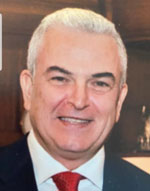 |
Constantino Tomasos
"Approach of our company to a major scale innovation not fully tested but dragging our interest is to predispose first prior to embrace it entirely. A common trend proposed nowadays by various makers in our industry is the one of the Autonomous Ship. Whilst this goal is still far away, progresses should be done in that direction. Vessels should be equipped with Sensors, Cameras, and higher Connectivity in order today to improve monitoring and shore assistance and tomorrow to have the possibility to use Artificial Intelligence Software tools, all based on collection and integration of datas." |
||
Shipping & The Environment |
|||
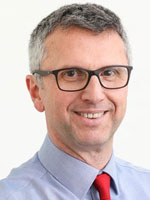 |
Theodosis Stamatellos
"There are big decisions ahead. With the transition to low-sulphur fuels now out of the way, pressure is mounting to move maritime’s decarbonisation efforts from talk to action. There are many options, and no single solution. For those wanting to invest in tonnage, the years ahead will require insight, information and confidence around the pricing and availability of future fuels and the landside infrastructure." |
||
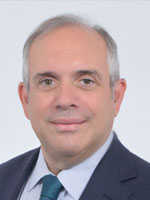 |
Dimitris Fafalios
"The focus on Greenhouse Gas(GHG) reduction in shipping has never been stronger. Thankfully, the world dry bulk fleet is one of maritime transport's most energy efficient and therefore least polluting sectors. Wishing to improve itself even further, bulk/tramp shipping calls for a global approach to GHG reduction through the IMO. More localised initiatives such as the proposed EU Emissions Trading Scheme(ETS) can be more detrimental if incorrectly applied to tankers and bulk carriers. Our industry must be allowed to work closely with regulators to achieve actual emissions reduction, reduce trade distortions, prevent carbon leakage and protect trans-shipment activity and employment at EU ports." |
||
 |
Polys Hajioannou
"Safe Bulkers Inc, was delighted to participate in the 7th Analyst & Investor Capital Link Shipping Forum. Greek Shipping is at the forefront of global trade. The forum addressed many significant topics such as the impact of COVID19, environmental regulations, decarbonization, geopolitics and alternative finance. The participants gained meaningful insights supported by the excellent coordination of the event and the quality of the panels which consisted by industry leaders. We at Safe Bulkers follow the market very closely, remain vigilant for opportunities when arising, which match our core growth and leverage strategies." |
||
Shipping & Capital – Alternative Sources & Options – The Public / Private Dilemma |
|||
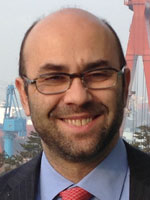 |
George Youroukos
"Access to a diversified and flexible mix of debt, both public and private, and equity capital can truly set apart a successful ship owner. By maintaining a strong balance sheet, multiple years of contract cover, and a large revenue backlog, which provides substantial forward visibility on cashflows. In the current environment of credit markets, we believe that there is an opportunity to utilize more supportive capital markets to opportunistically achieve meaningful balance sheet improvements." |
||
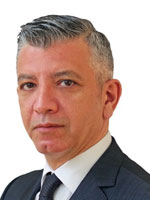 |
Michael Chalkias
"We have been fairly active in the private equity space having invested in six different ventures with four different partners, which have undoubtedly fueled our growth. We still see some appetite from some funds for shipping but no doubt much less than before. Fair to say that in many cases their investments didn’t play out as planned with a lot of them holding underperforming investments with prolonged and unknown exits. I wouldn’t argue that tankers, bulkers, containers or any other particular sector is preferred. In that sense, I think that most funds are “sector agnostic” but, at the same time, there are other factors in play that shape their investment focus. For example, distress situations or lately an ESG driven undertaking. The slow-down in PE backed deals does not necessarily indicate a lack of interest in shipping altogether. Sometimes it is just a matter of structure and offered terms. Most funds, still looking in the space, require anything from subordination of owner’s equity and seniority in distributions to preferred returns or going all the way to effectively mimicking pure credit at quite high cost. Also, we need to have in mind that it is the alternative and/or distressed assets investment arm of these funds that typically targeted shipping and nowadays, there are other industries/opportunities that might better fit that description." |
||
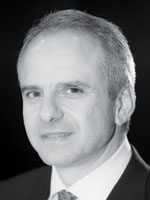 |
Valentios (Eddie) Valentis
"The shipping industry will continue to face challenges to obtain cost effective, flexible capital to meet its objectives. These headwinds include difficult market conditions, including the impact of Covid-19, poor historical investor returns, low company valuations, less availability of attractive bank debt and wide selection of competing public equities which are more liquid and less volatile. Companies will have to be opportunistic, nimble and creative in order to take advantage of a broad list of debt products and equity instruments available by various capital providers and markets worldwide. The resurgence of the Greek banks has been a bright spot in the otherwise gloomy ship-financing scene." |
||
Maritime Education – Encouraging a Maritime Career for the Younger Generation |
|||
 |
George Gourdomichalis
"The panelists, a representative cross section of Academics, Shipowners and professional Training and Education Advisors vividly discussed Maritime Education. Points made and embraced by all included the need for both Public and Private educational facilities to offer shipboard and shore based education, a "grass roots" approach to the very young allowing them to have a full understanding of our industry and its multifaceted role as well as, how the future will be shaped with technological advances opening the doors to many new career paths. Special note was made in connection to our Industry's efforts to assist the Public and Private Maritime Education institutions as well as governments of Shipping Nations in planning for tomorrow's educational needs. A common theme discussed was also the importance of women in the educational process and especially the need for better gender diversification in all aspects of both shipboard and shore based careers in shipping. Concluding, the participants agreed that both academic and practitioner input is a cornerstone of Maritime Education." |
||
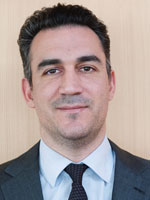 |
Vassilis Papagiannopoulos
"As marine technology develops new skills are required. At the same time time-tried skills remain as important as ever. We need the correct educational mix and experienced teachers that can equip maritime professionals according to the needs of the industry. The capacity of European and Greek Maritime academies needs to be increased. The seafaring profession should be introduced in schools through educational material as soon and as early as possible. In that way we will be able to include more young people and lay the groundwork so that European Shipping can have a successful future." |
||
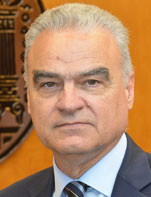 |
Yannis Golias
"The Eugenides Foundation has established a protagonistic role in Greek Maritime Education and has been actively involved in almost all issues related to Greek shipping. Lately, it was assigned by the Ministry of Maritime Affairs the mission to formulate an updated institutional framework for maritime education. So far the Foundation has supported the public maritime education due to the institutional absence of corresponding private initiatives. However, it equally welcomes private maritime education and is ready to cooperate with the relevant private Schools. To ensure that graduates – both of public and private maritime Schools - possess the required qualifications, they should be awarded the certificates of competence after successfully undergoing competence tests under the auspices of the Ministry." |
||
 |
Dinos Arcoumanis
"Discussed all factors affecting young people’s decision to pursue a career in shipping by either attending a Maritime Academy or pursuing conventional maritime studies. Influential factors include family tradition, social status, gender, personality and academic performance. Furthermore he attempted to compare public and private Maritime Academies in terms of infrastructure, quality of staff and academic programmes, sea service provision, equipment and laboratories as well as student entry requirements. Finally, Prof. Arcoumanis expressed his satisfaction with the Greek Government’s neutral approach to the issue of public versus private Maritime Academies as frequently expressed through its Minister of Shipping and Island Policy.” |
||
 |
Professor Michael Tamvakis
"Since its inception in 1983, one of the three aims of the Costas Grammenos Centre for Shipping, Trade & Finance has been the provision of excellent education for those wishing to pursue a career in the business of shipping. It is patently evident that it is not possible to view shipping in isolation. It is a de facto international business and is continuously affected by the state of the world economy, merchandise trade and commodities in particular, as well as geopolitics. For the young professional who wants to enter shipping, or wishes to be more involved on the business, finance and investment side, it is essential to be equipped with the necessary toolkit. This means a solid foundation in shipping and international economics, specialised shipping finance, commodity economics and also transferable skills in finance, accounting and business analytics. This approach was pioneering in the early 1980s and continues being indispensable in today's business environment. Although shipping faces a battery of fresh challenges on all fronts, whether operational, financial or technological, it remains a true enabler of global trade. In addition to teaching and research, the third pillar of our philosophy in maritime education is that of a continuous dialogue with business and government. We actively pursue this by bringing business leaders in the classroom, physical or virtual, to teach and discuss their business philosophy and practice; and also through international events which bring together business leaders, government officials, academics, alumni and current students under the same roof, in order to exchange views, ideas and insights on the ways maritime business can and should adapt in order to continue to flourish in a rapidly changing world." |
||
Looking Through A Crystal Ball - The Future of Shipping – Business & Investment Opportunities Across Shipping Segments |
|||
 |
Nicolas Bornozis
"We are coming to a panel that we host traditionally at our Posidonia event, with major owners who are active across many sectors of shipping and who are going to share with us their insight across the industry segments and on the direction and future of shipping. I don't think we could have a better panel. I would like to thank Keith Bilotti, Partner of Seward & Kissel for moderating it, and of course special thanks to the Greek Shipowners, Angeliki Frangou, Nikos Tsakos, Petros Pappas, George Procopiou and Vangelis Marinakis." |
||
 |
Vangelis Marinakis
"We are navigating into waters as far as pollution and environment is concerned, without proper guidance or regulation in what we need to do for the future. On top, there is minimal support from charterers, oil majors or even liner companies on what they are willing to pay you for investing in environmentally friendly technologies or what they really want as far as pollution is concerned and how to reduce emissions. Neither shipyards nor classification societies have real answers to the questions posed by shipping companies regarding new ships. We do not know what are the next steps we should be taking. There is a lot of talk but little progress when it comes to emissions and ultimately the shipowners are called to make decisions and pay the price without getting any compensation from anybody in the industry. So, it is important for us to work closely together through major bodies such as INTERTANKO and make our voice heard. “ He added “There is no doubt that slow steaming is the cleanest and most straightforward way for everybody in the industry. And it can be monitored. This option also creates opportunities for nearly everybody involved, but there seems to be some reluctance by the decision makers.” As Mr. Marinakis also said, "We risk millions and billions of dollars every day. Someone who has not direct interest cannot decide for us." He suggested closer cooperation between the shipowners, the IMO and governments. On the issue of consolidation, Mr. Marinakis emphasized that while in theory this is a concept that makes a lot of sense, in practice you need the right partners with the right motivation to make it work properly. For consolidation to work, you need to exploit synergies, bring expenses down and make better commercial decisions taking advantage of scale. However if management’s primary objective is simply to secure a good compensation package for themselves and their family, then consolidation would work much worse than to have a smaller company, which you control where the procedures and decision making are clearer and more effective.” Mr. Marinakis shared his disappointment from the merger with “Diamond S” calling it one of the worst business decisions he has ever made. “Ultimately, we found out that we did not share the same vision and motivation with the management and the company’s performance was unsatisfactory, as they failed to take advantage of the good tanker markets to sell older assets and take time charter coverage, while the commercial performance and overall governance has been disappointing." |
||
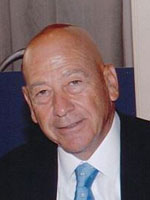 |
George J. Procopiou
"If a shipowner wants to order a ship, he is not sure what exactly to say to the shipyard about its type or size, as there are no transparent regulations. "IMO must realize that shipowners care about the environment, and choose the right enemy, which is pollution," he said. So for the existing ships, the idea is not to create the pollution in the first place (VLSFO), and not to put it under the carpet (scrubbers). "We have to leave the long-term estimates and talk about tomorrow," said Mr. Procopiou, explaining the importance of slow steaming. As he said, if the speed for existing ships goes to 10 knots, from the 15 in force today, all emissions (NOx, SOx, CO2 particulates) will be reduced immediately by more than 50%. "I do not understand who and why is against this measure," he continued. “The way forward for newbuildings is IMO, together with shipowners, engine builders and shipyards, to issue norms regarding the permissible amount of green house gas (GHG) emissions per ton mile of cargo transported and for every type of vessel (VLCCs, suezmaxes, capes, kamsarmaxes, etc.)”, Mr. Procopiou said. "Shipowners care about the environment and always buy what the market has best, to suit this purpose. The enemy is not shipping, which pollutes less than any other means of transportation, the enemy is pollution." |
||
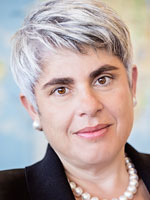 |
Angeliki Frangou
"The shipping industry is being impacted by two major uncertainties. The first – we are in a pandemic economy which favors transportation as the product is being brought to the consumer. The urgency with which movement is required adds premium. The second is: we are facing a technology revolution in terms of reimaging the seagoing vessels, everything from propulsion to energy generation. Until these two uncertainties resolve themselves, it is unlikely that a material amount of new vessels will be added to the order book – which is beneficial for industry earnings generally. The technology revolution should not be underestimated. The propulsion for short-haul transportation is basically resolved. Battery costs have dropped about 90% over the last ten years and are expected to drop another 50% over the next 5 years. Cost parity between battery powered vehicles and internal combustion engines should happen within the next 5 years. Similarly, consequently, short haul transportation of people by autos and goods, by local carriers will increasingly be battery powered. The answer for long haul transportation is unclear. In a zero carbon environment, LNG will be less desirable than other forms of energy, including hydrogen. Our tolerance for these different forms and the rate of technological innovation likely will be the keys to answering this question." |
||
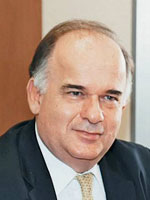 |
Petros Pappas
"It is a great pleasure for us to participate in the seventh Capital Link shipping conference. We at Star bulk remain optimistic about the dry bulk market for the next three years. During this period, we expect the supply and demand balance to experience a sustainable recovery. Supply will be limited as the orderbook stands at record low levels due to the uncertainty related to future decarbonization regulations. On the demand side dry bulk trade and ton-miles are expected to recover, propelled by the global infrastructure stimulus response to Covid19." |
||
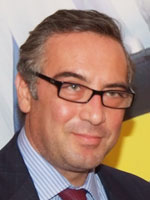 |
Dr. Nikolas P. Tsakos
"He stands in favor of a decision that would allow slow steaming in shipping, that is, a voyage with slower speed which would have a positive impact on the environment, since it would lower dramatically the marine fuel emissions, which however has not made any progress in terms of the International Maritime Organization. In regards to new orders, Dr. Tsakos said he's against ordering new ships at this time, since, due to the continued technological developments, no one knows what the right choice is. However, he reiterated, that Greek shipowners manage, not only the largest fleet in the world, but also the most modern and younger fleet worldwide, which allows them to not "need to enter into new contracts for no particular reason". Dr. Tsakos also noted that "changes are happening very fast and now we are looking at 2030 and not 2050. Slow steaming, which lost support, could be a drastic solution, with a view to 2030", he stressed. Particularly interesting was the view he expressed, according to which, "the low acceptance of slow steaming may be due to the fact that shipowners are not considered likeable personalities for some reason. "If someone other than us suggests it, then the chances of support from the whole industry will increase." |
||
The Rebirth of Greek Shipbuilding - a Presentation by ONEX |
|||
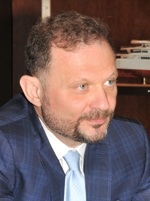 |
Panos Xenokostas
"The establishment of a Leading- Shipyard and Hub in the Eastern Mediterranean through the unification of the three large Shipyards of Neorion, Elefsis and Scaramaga under the umbrella of ONEX Group, and with the support and funding of DFC is a one-way street, in order to create a sustainable structure that can cope with the economic burdens of the past, the huge investments of the future, and to be able to dominate in the field of commercial shipping, new constructions for the Greek Navy, which will play a crucial role for the U.S. Navy, as well as for other allied fleets, and in the field of supporting energy infrastructure in the Eastern Mediterranean region. Greece is a small economy country, which must rely on National Champions with the infrastructures and necessary volumes in order to successfully compete against international players of neighboring countries, whilst creating new jobs and reviving the sector in its entirety following decades of decline." |
||
The New Generation – Ensuring Continuity - Looking Ahead With Confidence |
|||
 |
Alex Hadjipateras
"Alex Hadjipateras mentioned that in the fiercely competitive business of international shipping there is no role for sensitivity when working with family members. One must have a strong stomach and embrace professionalism. Regarding the role of family in management on the board, he said that he considers it of paramount importance retain the family values that were instrumental in the founding of the company specifically a closeness to the seafarer. He sees the biggest disruption in the shipping business as the technical revolution that is happening around how we interface with the vessels using artificial intelligence and that shipping companies are moving closer and closer towards a Silicon Valley led technical revolution." |
||
Closing Remarks |
|||
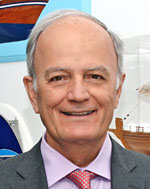 |
John Platsidakis
“Congratulations to Nicolas and his team as well as to the panelists. It has been a highly successful 2-day conference, well structured, well presented and a step towards where we may end up in the future, the tele-conferences and the tele-events! We enjoyed very fruitful discussions by highly regarded participants of high knowledge and intelligence. Over the years I have heard the expression "we live in challenging times" which I was rejecting as it was used very easily and very often. Now though I will adopt it, as I do believe that "we live in challenging times'! Shipping is used to live with and survive the fluctuations of the market as influenced by various factors. Recently though, in very short period of time, covid arrived and has made the difference. And what a difference! Covid has made a substantial and beyond any imagination negative impact on all world economies and the day to day lives of billions of people. Unavoidably shipping has been severely impacted. Another challenge for shipping is the rapid enhancement of technology and shipping has to take it into serious consideration for the impact it will have on existing ships and new buildings. An additional parameter is the environmental one and the objective to safe guard it. Of course shipping has been very respectful for the preservation and protection of the environment because the sea is where it functions and lives in. Also it has to comply with international and regional laws and regulations! Although there is room for improvement we have to make conscious effort to make the regulators and the public aware that unless all peripheral participants (eg charterers, shipyards, engine manufacturers, bunker suppliers) take an active role, the effort is deemed to fail! Looking at Greek shipping, what enhances optimism for the future is its wide base (some 650 ship management companies in the wider Athens area operate in excess of 4,000 vessels), its adaptability to ever changing market conditions, its commitment to cost efficient and high quality of services. The fact that it does not depend on financial aid from the Greek state gives it the push to do its best and fight for success and its future. Of course, retaining the first rank is a challenge and due care should be an on-going concern.” |
||

